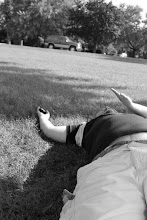Note: Today marks something of a Collective(ly) Unconscious first: a two-part post. I have tried (usually unsuccessfully) to limit my posts to the 800-1200 word neighborhood. I understand that blogging isn't necessarily a "story-telling medium" and anything more than that simply ceases to be a blog. Plus, it is mind-numbingly tedious. I know it is unfair to expect the reader to read a 2,000 word diatribe when I tune out if I see too many paragraphs left in most blogs. But today I have found a subject that I am not comfortable cutting down to my 1200 word neighborhood. I feel strongly about it and I feel it is a disservice to the subject to limit the length in anyway. I also believe, however, that it is unfair to expect the reader to read a blog entry that will take up too much of there time. Luckily for me, there is a natural halfway point, so I have decided to post the first half today and the second half tomorrow. Without further ado, here is the first part. Enjoy!
As an adult trying his best to remain professional to belong in a silly profession, it can be difficult to write a straight-faced article about symbolism in Harry Potter or brag to anyone who will listen that I can name every single episode of Lost ever produced. (This is true. Season 2, Episode 12: Fire +Water, a Charlie centric episode...look it up). Especially, when the occupation that you desire demands constant objectivism and careful analysis.
But at long last, I think I have found a loophole. As a journalist or a writer you are more than welcome to be a nerd...provided you can hide it well enough.
I can say safely what makes my tiny nerdy nerves spark and my nerdy blood flow faster as long as I "hide" it. One has to hide it under the cloak of "critical reviews" or "research papers" or "objective analyses of pop art". Only then can you rave about what makes you tick and what you obsess over. You have to had what you love and all your obsessions under a mountain of words and analyses.
When a grad student writes a thesis paper on "Superman as an allegory of Soviet Russia" what he or she is trying to say is: "I love comics so much that I want to abandon this mundane life and live within the hallowed panels of my heroes." When a movie critic argues that George Lucas uses Joseph Campbell's theories on Myth successfully in A New Hope, he or she is trying to say: "Star Wars is my life. It is so important to me that I couldn't bear to live without it. I am currently translating the Ewok language to English and have a sign that says 'Death Star' above my bedroom door." When a college professor volunteers to teach a class on classic Western themes in The Lord of the Rings, he or she is really just dying to tell the world: "these books changed my life and everything I believe in. I miss the times when I could explore my backyard, and using a stick as a sword, pretend to be Aragorn cutting down orcs."
As a professional, you have to intellectualize what you love. When the bosses-that-be sign your paycheck, they are doing it expecting you to provide an objective analysis of why something is of quality. You cannot simply say: "Because I love it." "Because I love it." may be the simplest way of expressing how you subjectively feel, but it doesn't pay the bills. That student, critic and professor all read what they read and watch what they watch because they love it. But in the world of pop culture analysis "Because I love it" isn't enough.
But why can't it be? The very nature of art is subjective. Some people love Shakespeare and some people hate it, just as I am sure there is at least one person who insists that Patch Adams changed his or her life forever, while the rest of the world insists that it sucked (and it did).
I think I understand now why "academics" and "professionals" are so hesitant to declare their love for something. It is easy to intellectualize and distance yourself from a piece of art because it is always scary when someone disagrees with you on something you feel so strongly about. When you love something so dearly, it can be legitimately terrifying when someone says otherwise...just ask The Dark Knight fans. They aren't only criticizing a work of art, they are criticizing you to your very core. Because the art you love defines you, as I have previously and clumsily attempted to prove. And when your job requires your objectiveness it can be even harder to simply say that you love something just because...well, you love it. The professional arena is a scary place to be a nerd.
So consider this a journalistic and critical call to arms. The next time that you are asked why you view what you view or follow what you follow, just say: "because I love it." Honesty is at a premium in the days of the Internet. And telling the truth will put you in a lonely place. But it is worth it.
Those nerds have the right idea.
"Tune in" tomorrow when I attempt to objectively explain exactly what "gets" me in art and culture.

3 comments:
"Real ganster-ass nerfighters don't run from nothin', 'cause real gangster-ass nerfighters can't run fast."
As a journalist, I plan to let my nerd flag fly freely, because my target audience will be a bunch of offbeat, lonely kids just like myself. I want to help people not feel alone through my writing.
Here here. Coincidentally, I love that song....the real one.
Ha-ha! I am not nearly gangster enough.
Post a Comment